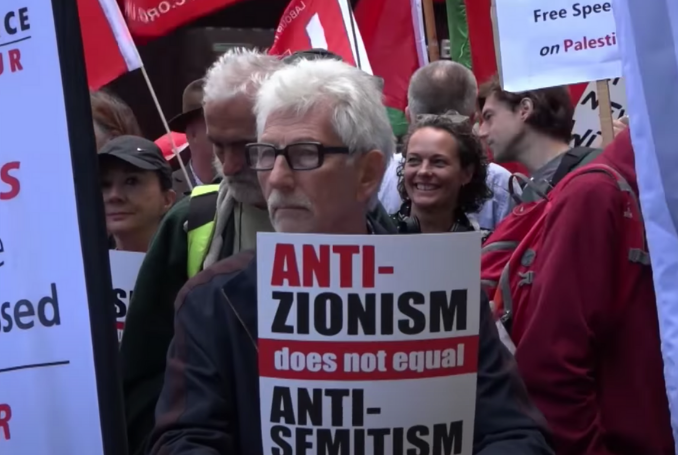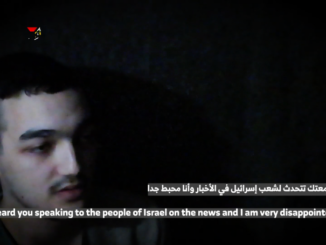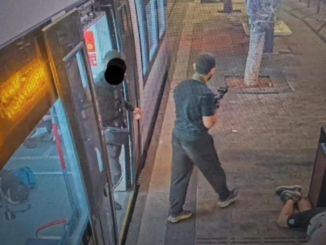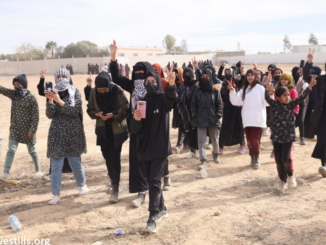
By Benay Blend
“Fear works if you cave in,” writes Ilan Pappé on Israel’s attempt to silence solidarity by using the International Holocaust Memorial Alliance’s (IHRA) definition of antisemitism, a document that claims it’s antisemitic to label Israel and/or its founding Zionist movement racist.
“Linking anti-Zionism to a definition of antisemitism is scholarly wrong and morally absurd,” Pappé continues. “This is like claiming that criticizing Apartheid South Africa at the time was an anti-Christian position.”
Written 6 years ago, Pappé’s words continue to be relevant. Fear of losing a job, losing academic standing, losing friends and family—all of these concerns, albeit justifiable, if acted upon allow Zionists to set the rules. Framed, trapped in a bad script in which they unwittingly play a part, solidarity activists become part of a game that will never result in change.
It is true that there has been a rise in antisemitism, due in part to a concomitant increase in global fascist movements. Known in the United States as Christian fascism, similar groups in Hungary, Poland, Sweden, Italy, Bulgaria, France, and the Czech Republic, writes Chris Hedges, “punish those blamed and scapegoated for their misery” in order to regain control over lives lost to neoliberalism and permanent war.
Because Jewish people are not the only groups targeted by these movements it makes sense that campaigns against the IHRA definition make clear that the struggle is against all forms of racism. In that way, other groups are brought into the fight making it impossible for Zionists to achieve their divide-and-conquer efforts.
It also hits at what is at the core of the IHRA definition: “Rather than addressing the main sources of anti-Semitism today (primarily the Western far right),” explains Samidoun: Palestinian Prisoner Solidarity Network, “ seven of the eleven examples associated with the definition mention Israel. Thus, it would be anti-Semitic to ‘deny the Jewish people their right to self-determination, e.g., by claiming that the existence of a State of Israel is a racist endeavor.’ ”
In his article on the right’s attempt to silence criticism of Israel, Ilan Pappé recounts all the ways that Zionism equates to racism, starting with the violent founding of the nation through 2016, the time of this article’s writing. “The oppression of the Palestinians is the outcome of an ideology,” he concludes, “and not a policy of this or that government.”
Aside from being factually incorrect, tying anti-Zionism to antisemitism creates several additional problems. For example, it links Zionism with Judaism, a connection that many in the solidarity movement have long tried very hard to break.
Indeed, there is the sentiment that the rise in antisemitism is due to the Zionist state’s treatment of Palestinians, thereby reinforcing the very link that the Zionist entity erroneously claims ties all Jews to the state of Israel. Moreover, it glosses over rising fascist movements which should concern all those who care about human rights, both inside Palestine solidarity and beyond.
By equating Zionism with Judaism,” explains Hanna Kawas, chair of the Canada Palestine Association (CPA), “by constantly pushing the theme that the ‘Jewish community’ is attached to Israel, the Zionists are responsible for most of the confusion surrounding the loyalty issue. Whether by design or blunder, this increases anti-Semitism.”
According to Prof. Rabab Abdulhadi, justice is “indivisible,” meaning that, on the one hand, each struggle is unique, therefore deserving of its own consideration, while on the other, injustice anywhere is a danger to all involved in the struggle for social justice. If that is the case, then the fight against the IHRA definition should be connected to more than just First Amendment rights, of which it clearly is a threat. Nevertheless, limiting the argument to this issue displaces Palestinians from the center, a place where the oppressed always belong in any struggle against oppression.
Moreover, the fight against the IHRA definition extends beyond America’s borders, thus while our Constitutional rights are clearly being threatened, U.S. campaigns should acknowledge the rights of those in other countries to speak out against Zionist abuses. For example, the Canada Palestine Association, the International Jewish Anti-Zionist Association, and Spanish activists in Madrid, among others, all protested against the passage of the IHRA definition in their regions.
It is more urgent now than ever to unite against its passing. In June of 2021, the Biden administration called the IHRA definition a “gold standard” in the fight against antisemitism. More recently, the White House announced that it was establishing a new task force in order to more effectively counter the rise of antisemitism.
“Obviously, tackling antisemitism is important,” writes Michael Arria for Mondoweiss, “but we often see such efforts hijacked by groups and individuals looking to target critics of Israel.” It remains unclear whether the IHRA definition will be endorsed by the new task force, but given Biden’s previous support for the policy, its quite likely that it will.
In New Mexico, the state where I live, Governor Michelle Lujan Grisham recently passed Executive Order 2022-118 which cites the IHRA as “an essential definitional tool used to determine contemporary manifestations of antisemitism,” partly because it “includes useful examples of discriminatory anti-Israel acts that can cross the line into antisemitism.”
Jewish Voice for Peace-Albuquerque and Santa Feans for Justice in Palestine have united to oppose the measure. It is especially critical that it be contested here because it is the home of several Native tribes, all of whom are also the victims of colonialization.
“Palestine is the moral barometer of Indigenous North America,” explains the Red Nation collective. “While antisemitism is a real issue and on the rise as a central tenet of rightwing authoritarianism and fascism, BDS and justice for Palestine are not anti-semitic. To say otherwise is to minimize and obfuscate the crimes of Israel and the suffering of Palestinians.” The blog post continues:
“There is a prominent tendency within US-based Palestine solidarity work to foster peace and reconciliation as a model of justice. We strongly object to this tendency. Israeli colonization perpetuates violence, regardless of the liberal niceties about “peace” and “respect” you place on it.”
Along these lines, there is a tendency to focus on Israel’s human rights abuses, thereby implying that if the Zionist state were held responsible for these transgressions there would be the possibility of justice for the Palestinian people. If colonialism is the “original crime,” as the Red Nation collective claims, it follows that will be no justice until the occupation is dismantled, while simultaneously ending the blockade of Gaza and allowing the Palestinian right of return.
“It is the responsibility of the entire anti-racist movement to take up this fight and to reaffirm its support for the Palestinian people and their resistance confronting occupation, apartheid, Zionism and colonialism,” concludes Samidoun.
In addition, many of those who advocate for justice in Palestine are also linked to the struggles of colonized people around the world, thereby turning this fight into a broader global movement for social justice.

– Benay Blend earned her doctorate in American Studies from the University of New Mexico. Her scholarly works include Douglas Vakoch and Sam Mickey, Eds. (2017), “’Neither Homeland Nor Exile are Words’: ‘Situated Knowledge’ in the Works of Palestinian and Native American Writers”. She contributed this article to The Palestine Chronicle.







